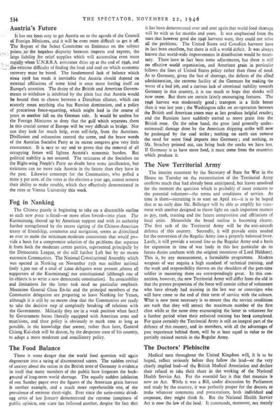The Food Balance
There is some danger that the world food question will again degenerate into a string of disconnected scares. The sudden revival of anxiety about the ration in the British zone of Germany is evidence in itself that many members of the public have forgotten the back- ground of long-term world shortage. The equally sudden jubilation of one Sunday paper over the figures of the American grain harvest is another example, and a much more reprehensible one, of the prevalence of extreme short-sight. Ever since the serio-comic dried- egg crisis of last January demonstrated the extreme jumpiness of public opinion, one scare has followed another, despite the fact that it has been demonstrated over and over again that world food shortage will be with us for months and years. It was emphasised from the start that however good the 1946 harvests were, they could not solve all the problems. The United States and Canadian harvests have in fact been excellent, but there is still a world deficit. It was always known that world-wide improvements in distribution would be neces- sary. There have in fact been some adjustments, but there is still no effective world organisation, and American grain in particular follows the lines of United States policy rather than those of need. As to Germany, given the fact of shortage, the defects of the allied administration, the extreme facility of the Germans for making the worst of a bad job, and a curious lack of emotional stability towards Germany in this country, it is too much to hope that shocks will now cease. But there are certain faintly encouraging features. The 1946 harvest was moderately good ; transport is a little better than it was last year ; the Washington talks on co-operation between the British and American zones may at last produce helpful results; and the Russians have suddenly started to move grain into the British zone. On the other hand, the great (and generally under- estimated) damage done by the American shipping strike will now be prolonged by the coal strike ; nothing on earth can remove the need for some food imports into Germany ; and nothing, as Mr. Strachey pointed out, can bring back the stocks we have lost. If Germany is to have more food, it must come from the countries which produce it.


































 Previous page
Previous page